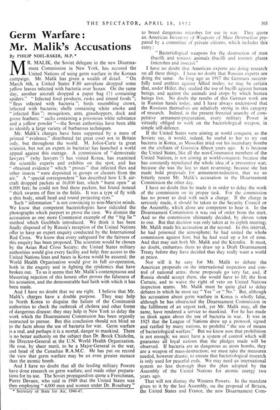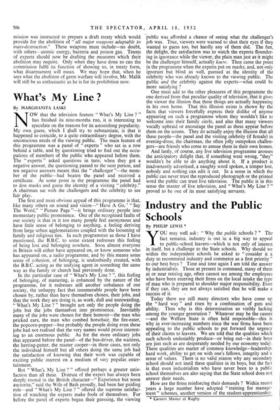Germ Warfare : Mr. Malik's Accusations
By PHILIP NOEL-BAKER, M.P. *
MR. MALIK, the Soviet delegate in the new Disarma- ment Commission in New York, has accused the United Nations of using germ warfare in the Korean campaign. Mr. Malik has given a wealth of detail. "On March 6th, a United States F.80 aeroplane dropped some yellow leaves infected with bacteria over Sunan. On the same day, another aircraft dropped a paper bag (!) containing spiders." "Infected food products, rusks and tinned foods "; "fleas infected with bacteria "; birds resembling crows, infected with bacteria; shells containing white smoke and "infected flies "; mosquitoes, ants, grasshoppers, duck and goose feathers; "sacks containing a poisonous white substance and a yellow powder "—the Soviet authorities have been able to identify a large variety of barbarous techniques.
Mr. Malik's charges have been supported by a mass of printed "evidence," distributed (at great cost) not in Britain only, but throughout the world. M. Joliot-Curie (a great scientist, but not an expert in bacteria) has launched a world appeal against this outrage. A commission of "democratic lawyers" (why lawyers ?) has visited Korea, has examined the scientific experts and exhibits on the spot, and has "obtained evidence" which " proves " that infected flies and other insects "were deposited in groups or clusters from the air." A "special correspondent" has described how U.S. air- craft dropped packets at 16,000 feet, which "burst open" at 6,000 feet; he could not find these packets, but found instead "thick swarms of flies in the fields. It was a type of fly with a thin body, small head and round projecting eyes."
Such " information " is not convincing to non-Marxist minds. We know that competent bacteriologists have ridiculed the photographs which purport to prove the case. We dismiss the accusation as one more Communist example of the "big lie" method which Goebbels introduced. We think it has been finally disposed of by Russia's reception of the United Nations offer to have an expert enquiry conducted by the International Red Cross. We know that every safeguard for the fairness of this enquiry has been proposed. The scientists would be chosen by the Asian Red Cross Society; the United States military authorities would give every facility and help; free access to the United Nations lines and bases in Korea would be assured; the World Health Organisation would give its full co-operation, both in the enquiry and in fighting the epidemics that have broken out. To us it seems that Mr. Malik's contemptuous and blustering rejection of this honest offer proves the falseness of his acusation, and the demonstrable bad faith with which it has been made.
And I have no doubt that we are right. I believe that Mr. Malik's charges have a double purpose. They may help in North Korea to disguise the failure of the Communist authorities to check the outbreak of cholera and other forms of dangerous disease; they may help in New York to delay the work which the Disarmament Commission has been urgently instructed to pursue. But this conclusion should not blind us to the facts about the use of bacteria for war. Germ warfare is a real, and perhaps it is a mortal, danger to mankind. There is no better authority on the subject than Dr. Brock Chisholm, the Director-General at the U.N. World Health Organisation. He rose, by sheer merit, to be a Major-General in the war, and head of the Canadian R.A.M.C. He has put on record the view that germ warfare may be an even greater menace than the atomic bomb.
And I have no doubt that all the leading military Powers have done research on germ warfare, and made other prepara- tions for its use. The Soviet propagandists quote a Frenchman, Pierre Devaux, who said in 1949 that the United States was then employing "4,000 men and women under Dr. Rosebury " * Secretary of State for Air, 1946-47. to breed dangerous microbes for use in war. They quote an American Inventory of Weapons of Mass Destruction pre- pared by a committee of private citizens, which includes this entry : "Bacteriological weapons for the destruction of man (bacilli and toxins); animals (bacilli and toxins); plants (microbes and insects)."
I have no doubt that American experts are doing research on all these things. I have no doubt that Russian experts are doing the same. As long ago as 1917 the Germans success- fully used anthrax against Allied mules; we may be certain that, under Hitler, they studied the use of bacilli against human beings, and against the animals and crops by which human beings live. No doubt the results of this German work are in Russian hands today, and I have always understood that the Russians themselves are relatively strong in this category of research. Indeed, in the present frenzied anarchy of com- petitive armament-preparation, every military Power is virtually obliged to work on the bacteriological weapon, in simple self-defence.
If the United States were aiming at world conquest, as the Soviets say, it would, indeed, be useful to her to try out bacteria in Korea, as Mussolini tried out his incendiary bombs on the civilians of Guernica fifteen years ago. It is because the United States, like all the non-Communist members of the United Nations, is not aiming at world-conquest; because she has constantly repudiated the whole idea of a preventive war; because she was the last to start re-arming; because she has made bold proposals for armament-reduction, that we so bitterly resent Mr. Malik's accusation in the Disarmament Commission the other day.
I have no doubt that he made it in order to delay the work of the commission on its proper task. For the commission has no power to deal with such a charge. If the charge is seriously made, it should be taken to the Security Council or the Assembly, which alone are competent to hear it. In the Disarmament Commission it was out of order from the start. And so, the commission ultimately decided, by eleven votes to one. But that decision was only taken at its eighth meeting; Mr. Malik made his accusation at the second. In this interval, - he had poisoned the atmosphere; he had united the whole commission against him; but he had used up a lot of time. And that may suit both Mr. Malik and the Kremlin. It must, no doubt, embarrass them to draw up a Draft Disarmament Treaty before they have decided that they really want a world at peace.
Nor will it be easy for Mr. Malik to debate the American proposals on the international inspection and con- trol of national arms; those proposals go very far, and, if Russia should accept them, she would have to lift the Iron Curtain, and to waive the right of veto on United Nations inspection teams. Mr. Malik must be quite glad to delay debates in which he must say " Yes " or "No." But, although his accusation about germ warfare in Korea is wholly false, although he has obstructed the Disarmament Commission in the fulfilment of an urgent task, yet Mr. Malik may, all the same, have rendered a service to mankind. For he has made us think again about the use of bacteria in war. It was in 1925 that the League of Nations drew up a protocol, signed and ratified by many nations, to prohibit "the use of means of bacteriological warfare." But we know now that prohibition is not enough; we must have a system of control which will guarantee all loyal nations that the pledges made will be observed. If bacteria are as dangerous as atom bombs, they are a weapon of mass-destruction; we must take the measures needed, however drastic, to ensure that bacteriological research is only used for peaceful ends. We may need an international system no less thorough than the plan adopted by the Assembly of the United Nations for atomic energy two years ago.
That will not dismay the Western Powers. In the mandate given to it by the last Assembly, on the proposal of Britain, the United States and France, the new Disarmament Corn- mission was instructed to prepare a draft treaty which would provide for the abolition of "all major weapons adaptable to mass-destruction." These weapons must include—no doubt, with others—atomic energy, bacteria and poison gas. Teams of experts should now be drafting the measures which their abolition may require. Only when they have done so can the commission fulfil its function of showing us, in treaty form, what disarmament will mean. We may hope that, when he sees what the abolition of germ warfare will involve, Mr. Malik will still be as enthusiastic as he is for its prohibition now.



































 Previous page
Previous page